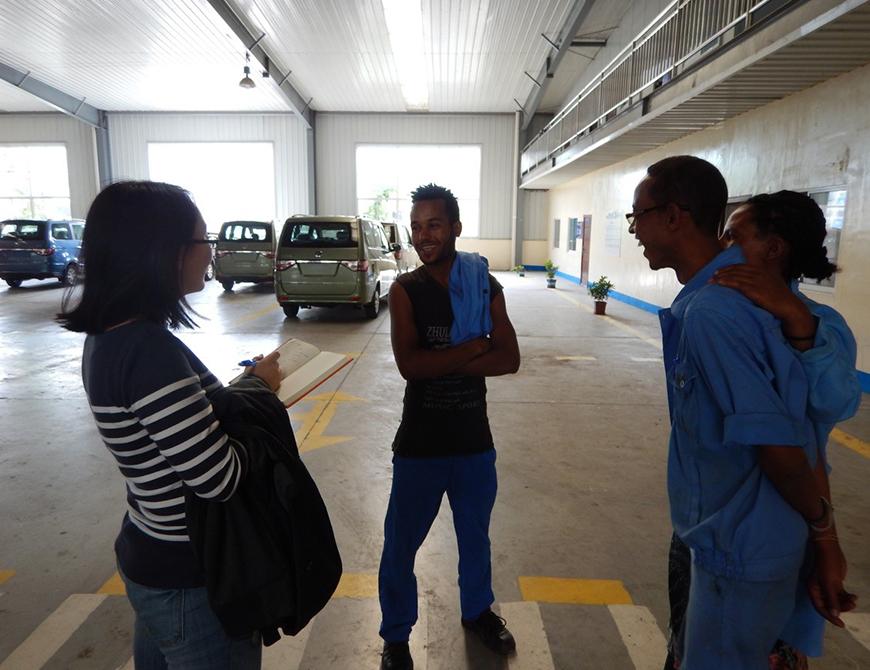Ding Fei
Ding Fei is an Assistant Professor in the Department of City and Regional Planning. As a development and economic geographer, Fei has areas of expertise in the political economy of international development, global production networks, infrastructure-led industrialization, capital-labor relations, South-South migration, and China-Africa relations. Cutting across the fields of critical development studies, economic geography, and labor studies, her empirical research combines a political economy approach to examine the norms, values, and developmental impacts of Chinese investment in Africa with an ethnographic lens into the everyday encounters among states, firms, and workers. Fei received her Ph.D. from the Department of Geography, Environment, and Society, with a doctoral minor in Geographical Information Sciences at the University of Minnesota. In 2020–21, she was an early career fellow in China Studies at the American Council of Learned Societies.
"I delve into the assumed homogeneity of "Chinese capitalism" to understand how Chinese state companies, state-affiliated agencies, and private investors interact with institutions/individuals in host countries to create new urban living conditions."
Academic Research/Specialty Areas
- Cities
- Economic development
- Infrastructure
- Infrastructure planning
- International studies in planning
- Social policy
- Urbanism
Related Links
- The Belt and Road Podcast: Harnessing Chinese Telecommunications Investments to Ethiopia's Benefit with Ding Fei
- The China in Africa Podcast: Debunking Myths About Chinese Labor in Africa
Related News
- Capturing the Missing Pieces: Connection and Understanding Through Research
- New Leadership and Faculty Join AAP
Classes (Selected)
- CRP 3201/6201 Qualitative Research Methods
- CRP 6720 International InstitutionsThe course introduces students to the theory and practice of international development planning from an institutional perspective. It begins with an introduction to the field and provides a historical, institutional and theoretical overview. The course examines the main actors involved in the practice of international development planning: the public sector, civil society, community-based organizations and the private sector. It critically analyzes some of the large international institutions engaged in urban policy-making and global governance. The last section of the course examines timely topics that have the potential to reconfigure the institutional landscape, planning practice, and cities.
- CRP 3850/5850 Special Topics: China-Africa Encounters
Awards, Grants, and Fellowships (Selected)
- Affinito-Stewart Grants, President’s Council of Cornell Women (2024)
- The Hong Kong University of Science and Technology–Cornell University Joint Seed Grant (2022)
- Cornell Center for Social Sciences Research Grant (2022)
- Early Career Fellowship in China Studies, Henry Luce Foundation/American Council of Learned Societies (2020)
Exhibitions and Presentations (Selected)
- Assembling Chinese Health Engagement in Africa: Structures, Strategies, and Emerging Patterns. China-Africa Relations in the Post-Pandemic World. International Symposium. Lingnan University, Hong Kong, April 12–14. (2023)
- Globalization of Chinese CSR Standards in Africa. In China's Green Soft Power: Discourses, Policies, Practices Panel. Annual Meeting of Asian Studies Association, March 16–19. (2023)
- Chinese-style Economic Zones, Policy Mobilities, and the Implications for Urbanizing Futures. Annual Meeting of Development Studies Association, July 10–12. (2022)
Publications (Selected)
- Fei, D., (2024) "Transnationalizing intrapreneurship of Chinese private investment in Africa." Environment and Planning A: Economy and Space p.0308518X241235578.
- Fei, Ding (2023) "Internationalizing China Standards through Corporate Social Responsibility: An Exploratory Study of Chinese State-owned Enterprises in Africa." Journal of Contemporary China. Published online.
- Fei, Ding (2023) "Chinese in Africa: Expatriation Regime and Lived Experience." Journal of Ethnic and Migration Studies. Published online.
- Fei, D. (2022) "Assembling Chinese health engagement in Africa: structures, strategies and emerging patterns." Third World Quarterly 43(5), 1093-1114.
- Fei, Ding (2020) "The Compound Labor Regime of Chinese Construction Projects in Ethiopia." Geoforum 17:13–23. doi: https://doi.org/10.1016/j.geoforum.2020.08.013.




